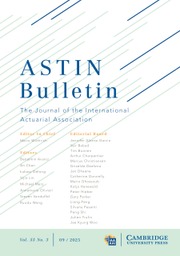Crossref Citations
This article has been cited by the following publications. This list is generated based on data provided by Crossref.
H. Panjer, Harry
and
Shaun Wang
1993.
On the Stability of Recursive Formulas.
ASTIN Bulletin,
Vol. 23,
Issue. 2,
p.
227.
Barzanti, L.
and
Corradi, C.
1994.
C411. A note on the approximate solution of the volterra renewal equation using upper and lower approximations.
Journal of Statistical Computation and Simulation,
Vol. 49,
Issue. 3-4,
p.
225.
Ramsay, Colin M.
and
Usabel, Miguel A.
1997.
Calculating Ruin Probabilities via Product Integration.
ASTIN Bulletin,
Vol. 27,
Issue. 2,
p.
263.
Usábel, Miguel
1999.
Calculating multivariate ruin probabilities via Gaver–Stehfest inversion technique.
Insurance: Mathematics and Economics,
Vol. 25,
Issue. 2,
p.
133.
Beekman, John A.
1999.
“Bounds for Ruin Probabilities in the Presence of Large Claims and their Comparison”, Vladimir Kalashnikov, April, 1999.
North American Actuarial Journal,
Vol. 3,
Issue. 2,
p.
128.
Usábel, M.
2001.
Ultimate Ruin Probabilities for Generalized Gamma-Convolutions Claim Sizes.
ASTIN Bulletin,
Vol. 31,
Issue. 1,
p.
59.
Ramsay, Colin M.
2003.
A solution to the ruin problem for Pareto distributions.
Insurance: Mathematics and Economics,
Vol. 33,
Issue. 1,
p.
109.
Norkin, B. V.
2008.
Stochastic successive approximation method for assessing the insolvency risk of an insurance company.
Cybernetics and Systems Analysis,
Vol. 44,
Issue. 6,
p.
892.
Das, Jagriti
and
Nath, Dilip C.
2016.
Burr Distribution as an Actuarial Risk Model and the Computation of Some of Its Actuarial Quantities Related to the Probability of Ruin.
Journal of Mathematical Finance,
Vol. 06,
Issue. 01,
p.
213.

